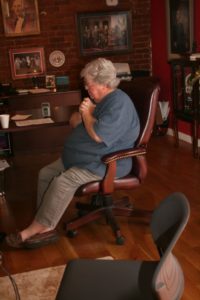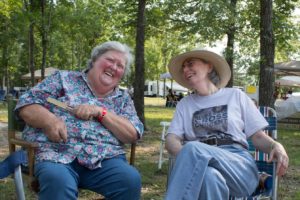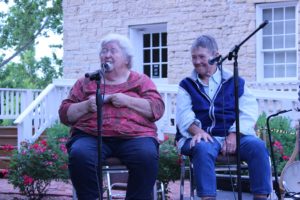200 STORIES, FEATURING MARIDETH SISCO
As Missouri Folk Arts staff continues to share 200 stories over the course of 52 weeks in 2021, we occasionally will feature guest portraits composed by community scholars. Previously, we shared a story by Marideth Sisco about the late Jennie Cummings, founder of the Missouri Cowboy Poetry Festival. That story was based on interviews and research that Sisco conducted in 2019. Additionally, our recent post about the Old-time Music, Ozark Heritage Festival was deeply informed by Sisco’s research report. Today, we share something a little different–a self-portrait of one of Missouri’s celebrated storytellers and vocalists. We hope you enjoy author Marideth Sisco’s portrait of storyteller Marideth Sisco, about how she came to be a storyteller and how she learned to teach her apprentices to be storytellers, too.
VOICES IN THE DARK
by Marideth Sisco

Marideth Sisco shares stories and strategies for collecting stories at a Community Scholars Workshops. Photo by Lisa L. Higgins
I was a storyteller before I had language. My earliest memories are front porches and firesides, the nighttime filled with the voices of my family conveying humor, love, and sadness, telling our stories.
Once I had language, I began interpreting the tales they told when the family gathered at day’s end, telling what happened, pondering what it meant. In deep summer darkness, stories mingled with the soft flutter of a folded newspaper as they fanned away the heat. In winter, it was flickering firelight, the wood- or coal-scented air, the sudden bitter draft as someone entered or left the one room where the heat was kept. And always the stories. And songs. My grandmother’s cracked soprano. Uncle Tom’s clear tenor. Voices entwining in the dark, inscribing the boundaries of my world.
One thing I learned early was that if I curled up beneath or behind a chair and feigned sleep, I might hear the really good stories they saved for after the children were asleep. How Daddy’s brother Bob stole his in-law’s timber. The unfortunate Lyle Harvey, shot by his wife’s lover as he tried to tell the man he could have her. Molly’s son, Dorris, who never returned from the war. They were people I only knew of by name. It didn’t matter. They were characters in an ongoing fable of who we were as a family. As I grew older, I joined to weave in stories where I was one of the characters.
One day, my aunts, who ran a grocery store, gave me a candy bar, and I decided that other kids should have one, too. So I started offering the customers’ children a candy bar. It didn’t last. But the telling of it lasted until after I was tired of it. And then there was the time Uncle Leonard played Santa Claus. In trying to escape when I followed him out the door, he fell over the wood pile, and I remarked that, “When Santa Claus cusses, he sounds just like Uncle Leonard.” That story was told until everyone was gone who had heard it. I had become part of the larger story . . .
Somewhere in those very early years, Great Uncle Tom discovered that, due to my having absorbed some of those songs sung at night when I wasn’t supposed to be awake, I could actually carry a tune. And remember a lyric. So he decided to teach me the popular songs of the day, just to see if I could do it. I was happy to oblige.
Tom and his wife Nancy operated the Butterfield Hotel, where we all lived in the early 1940s, and bolstered his income by working as a clerk for a local auctioneer. Sometimes he tended me and would cart me along to auctions and, when the action was slow or stopped, he would stand me up on a crate and tell me to sing a song. And I would. I never learned about stage fright and have never suffered it. I sang “Harbor Lights” and “Slow Boat to China” and “Sentimental Journey” to country farmers. And everybody loved me. How could they not? I was something short of three years old.
To me today, standing now at what is much nearer the other end of my storytelling and singing career, the ability to perform a piece learned and practiced before an audience seems less to do with training and execution than with the certainty that you are adequate to the task, and that you will be well received. In short, that you are loved. And what you do, if done well, will be appreciated.
Now, my father went AWOL in wartime to come home when I was born to, see me and because he was mad with homesickness and with missing my mother. And when he went back and was tossed in the brig at the naval station in San Francisco, my mother left 6-month-old me in the care of my aunts and extended family and went to be near him. Got a job in a war plant, and didn’t come home until he could come with her. So, I was passed around among family members and was away from my mother for nearly three of my early, most formative years. But I never had occasion to question even once that I was deeply loved.
It wasn’t just the candy bars. Even in those early months as I lounged in my crib beside the coal stove at the back of the store, my aunts, as they bustled about, stocking, cleaning, waiting on customers, they loved me. I knew it because every time they passed, they kissed me. Every time. It got to be such a thing that my grandmother finally laid the law down. They had to stop it, she said, because she was tired of cleaning endless lipstick prints off my cheeks, and my cheeks were getting chapped. So they stopped. At least they stopped kissing my cheeks.
For the rest of the two-and-something years they had me, they would pass by, grab me by the ankle, and kiss the bottom of my foot. And that, I believe, is the foundation, not for everything that has happened since, but for my reaction to everything since, and for the confidence, the sureness with which I have met every encounter and every challenge. Because they loved me. Every minute.
***
I grant that not everyone is as blessed from their very beginnings as I was in those long-ago days. That’s just my story. But it’s something that helps me teach storytelling to one who wants to learn it. It reminds me of where the stories come from, and what helps them to come forth. The stories are always there waiting. It’s the teller who must master the telling. It is confidence that often suffers more than craft. How does one teach that?
What I so appreciated from participating in the Traditional Arts Apprenticeship Program, offered by the Missouri Folk Arts Program, was not just a chance to teach technique, story construction, plot, and character. With twenty years as a journalist and a Master’s degree in Narrative, I had the tools, and I taught those things, certainly. But I found almost every time that what prevented my apprentices from excelling at telling their stories—and they had wonderful stories—was self-doubt: the suspicion that their stories weren’t good enough; the telling not smooth enough; their presentation not strong enough. They questioned themselves, and it silenced them.
I soon saw my task was to disable the fear that was holding them bound. I couldn’t grab an ankle and kiss their little soles. It was far too late for that. But I could perhaps interrupt the flow of that unhelpful voice lurking in their own darkness, some childhood slight or a criticism taken personally, some cruelty. Mastering the craft was easy. It was themselves they didn’t trust. Fixing that was my largest task.
Suzanne Chilton, my first apprentice, had been doing performance storytelling for years. She was quite good. She played a Civil War-era woman dressed in calico, telling in a smooth Southern drawl of life in 19th-century America. Her challenge, she said, was that she was unable to tell a story as herself. She could only perform in character. She was unable to tell her own story.

Marideth Sisco and Suzanne Rayfield Chilton (now McKenzie) shared stories at a festival during the Traditional Arts Apprenticeship Program. Photo credit: Darcy Holtgrave
So I had her preface her characterization by telling me about the character. Who was this woman she was portraying? Why was her story important? And why did Suzanne care? I asked her about her research and the details she had discovered. “Tell me what you found,” I said.
And as she began, without noticing, she referred to the woman as “she” and not “I”. She went on for some minutes before I said, “Now step into the character.” And she did. Her eyes flew open, surprised.
“That’s how you do it,” I said. “Just like that. What you have to say is just as important as anything your character might tell us. First give us your knowledge, your feelings. You’re the only one who knows why she’s important. Tell us. Then let her speak.”
It took a while, but eventually she was able to move in and out of the character with ease, and added more characters later. I heard from her a little while back. She is a storyteller at a folklore center in Florida, telling stories as a character, and as herself.
Patricia Hight, my second apprentice, had a different blockage but from the same cause. The stories she told were sweet, heartwarming, and often heartbreaking. They moved her audience deeply. But they overwhelmed her, too. She would begin describing an episode with an extraordinary attention to detail. But then her throat would tighten, her voice rise, caught in some excruciating emotion. She spoke of her grandmother’s struggle to cope with aging, her father’s PTSD, her brothers’ battles with drugs and mental illness. Deep, important stories. She just couldn’t move past the emotion that closed her throat. They were too deep. Too big. So I assigned smaller stories. “Tell about your day, your garden, your walks to the creek. Don’t go there. You can go there later. For now, tell me what you love. Tell about life in the moment.”
She did so and began to forget to be afraid.
Next step, I said, write them down. Instead of telling them, you can read them. If they hurt you, put the words down a few at a time, deliberately.
It was slow going. But over time, she became more deliberate, more measured. And the tales, large and small, became more moving for their sparseness. The more she wrote, the less she thought about her worth and more about the worth of the story.

Master storyteller Marideth Sisco and apprentice Patricia Hight tell tales at the 2017 Backyard Concert Series in Jefferson City. Mo. Photo credit: Deborah A. Bailey
Pat was also dealing with her own mortality, struggling with terminal metastatic breast cancer. Her story had a sad ending. But by the time she passed, she had completed more than sixty essays about her life and her garden—and more.
My hope is that this telling of my story and the stories of my apprentices will encourage other tellers to value the worth of their own stories, to conquer the demon of self-doubt and move their valuable voices into the light.
